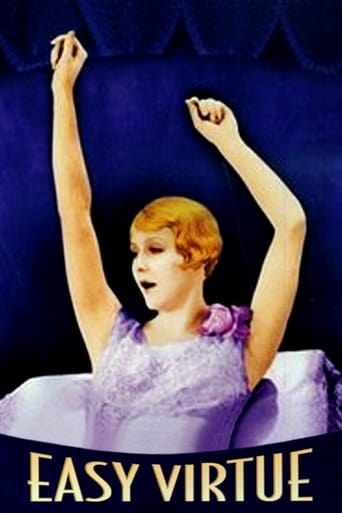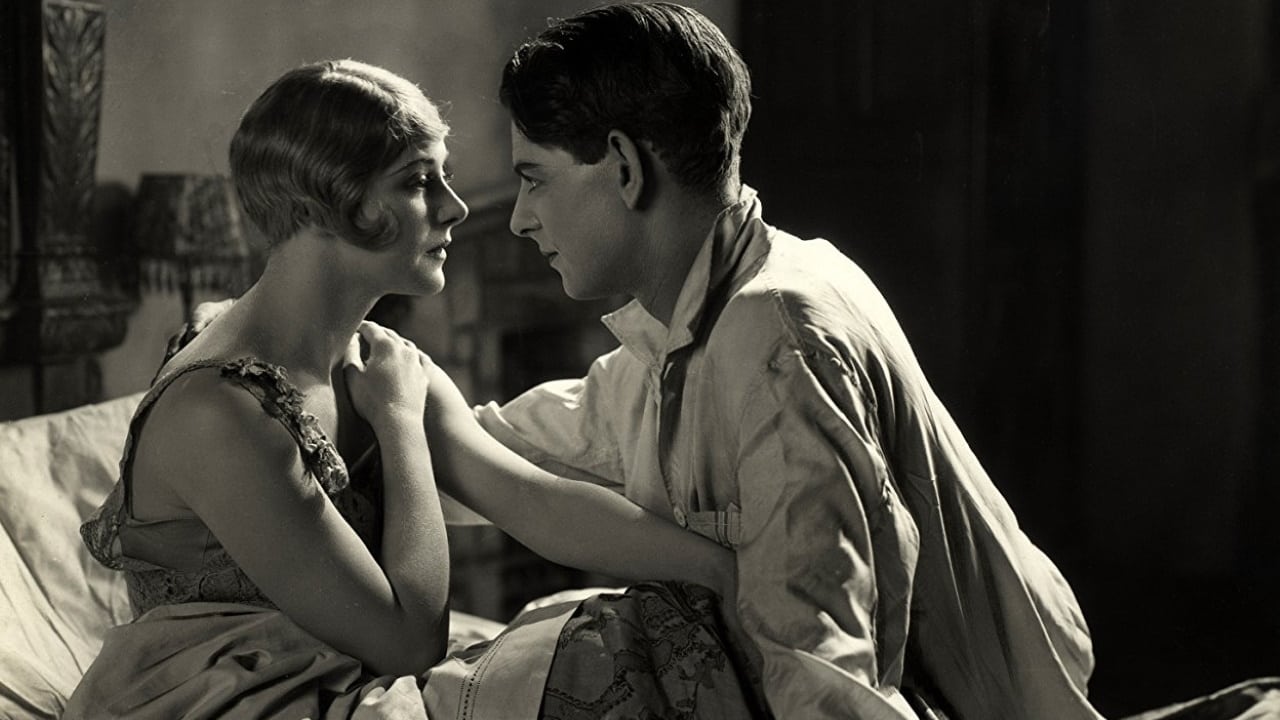Syl
Isabel Jeans was a well known British actress of stage and screen. In Sir Alfred Hitchcock's silent screen adaptation of Sir Noel Coward's play, "Easy Virtue." Isabel Jeans plays a woman with easy virtue which is explained in the beginning of the film. Jeans is perfectly cast as Larita Filton, a British divorcée. The film begins with divorce proceedings. The press and the judicial system have harshly judged the beautiful woman who testifies and defends her honor but fails to do in the courts and the public. She escapes to the South of France where she meets and falls in love with John. She doesn't tell him about her past. Isabel Jeans would have won awards for her performance. This film is an early indication of Hitchcock's vision and genius about film making process as well.
Michael_Elliott
Easy Virtue (1928) ** (out of 4) Isabel Jeans plays Larita Filton, a woman who is abused by her drunken husband who thinks she is having an affair with a painter. When the husband confronts them the painter kills himself and soon the wife's reputation is tarnished in a divorce court. She flies off to France where she falls in love with a man (Robin Irvine) but soon his family learns of her past. This is a pretty tame and rather lame silent from Hitchcock and it's only real asset is those wanting to seek out the director's early work. The word melodrama is written all over this thing but there really isn't too many original ideas in its screenplay. The most interesting scenes are the early ones in the court where Hitchcock brings some nice style to the film when we get the various flashbacks, which then cut back to the court. The scenes involving Jeans and Irvine falling in love are all overly dramatic and the stuff with his mother come off fairly weak. Jeans is pretty good in her role but she really isn't given too much to work with. I found Irvine to be rather bland throughout the film as was the rest of the supporting cast. This type of melodrama ran ramped throughout the silent era and if it weren't for Hitchcock's name being attached, this one here would certainly be forgotten.
ackstasis
Throughout the 1920s and the early 1930s, it's obvious that the Master of Suspense was still finding his feet. 'The Lodger (1927)' was Hitchcock's first sign of future promise, a truly effective silent thriller, and many of the film-making techniques he experimented with would later form an integral part of his many masterpieces. We are all aware, of course, that the director's specialty always lay in suspense, coupled with his audacious brand of dark humour. Perhaps, at this time, he was still unsure of which direction he wanted to head, or maybe he simply tried his hands at anything in order to maintain an income. Either way, 'Easy Virtue' his eighth film is a rare opportunity to see Hitchcock attempt a melodrama, and the results are interestingly mixed. The story was based on a Noel Coward play, a medium upon which the director would rely heavily for many of his later films.'Easy Virtue' starred British actress Isabel Jeans, who had previously appeared in Hitchcock's 'Downhill (1927)' and would later return in 'Suspicion (1941).'The story concerns a young lady named Larita Filton (Isabel Jeans), who had experienced a difficult and much-publicised divorce when her infidelity with an artist led to her husband being wounded and the artist's suicide. Frustrated by the constant pursual of photographers, Larita takes a peaceful holiday to France, where she meets a kind and gentle man named John Whittaker (Robin Irvine), whom she soon marries, much to the surprise of the man's family. While John's father (Frank Elliott) and his former sweetheart Sarah (Enid Stamp-Taylor) do their best to accept this new addition to the family, John's stern and suspicious mother (Violet Farebrother) does her best to destroy their relationship. The acting all-round is quite good, particularly Farebrother, whose character immediately evokes an intense feeling of dislike. Jeans is something of a two-sided character; we understand her plight for happiness, and yet she's got such a sense of arrogance about her that we're much more sympathetic towards her conflicted husband.At just 60 minutes in length, 'Easy Virtue' outstays its welcome by a good quarter of an hour. The centre section of the film drags on without really going anywhere, but is partially made up for by an interesting beginning and end. The court trial in the film's opening was quite brilliant, with Hitchcock displaying the technical imagination that would ultimately make him great. His use of match cuts to lead into the flashbacks such as the judge's swinging spectacles and the grandfather clock, and the focus on the drinks pitcher demonstrate a keen eye for the editing technique, and I would have been happier had more of the film been dedicated exclusively to the trial. The ending is also noteworthy, with the film denying us the usual happy ending, offering us a full serving of bitter pessimism; Larita emerges from the court room, completely beaten, and accepts that her life will never be the same again.
kai ringler
This is my first Hitchcock silent film. this film grew on me as i watched it, i thought it started out slow . but slowly developed into something very interesting. i was upset that i missed Hitch's cameo.. he's a sneaky one. this is my 4th silent film that i have watched, and this one compares almost to the other ones, but the others are classics.. phantom, Dr Jekyll, and hunchback. so this one kinda had some unfair competition. like i said before it started slow, but it quickly engrossed me after the part where she goes to his parents house to meet the family.. i thought her character was unfairly judged by his family to the point where i was glad she didn't marry him, i admired her character for standing up to the mother in that one,, what s really awful mother in law. without ruining the ending for those who haven't seen this early Hitchcock gem,, i loved the ending.


 AD
AD


